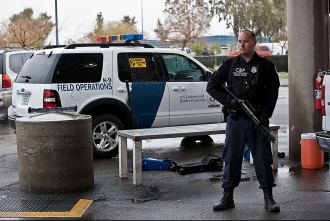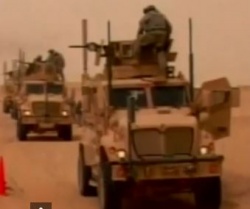Difference between revisions of "Police state"
(image) |
(image) |
||
| Line 1: | Line 1: | ||
{{description|Wikipedia terms a police state as a "fundamentally authoritarian" form of government, and cites examples of the Soviet Union and its satellites plus North Korea. No mention in the article of the 21st century global shift towards authoritarian policies by the so-called Western democracies, such as the gutting of civil liberties and the use of the mass surveillance programmes and false flag terror.}} | {{description|Wikipedia terms a police state as a "fundamentally authoritarian" form of government, and cites examples of the Soviet Union and its satellites plus North Korea. No mention in the article of the 21st century global shift towards authoritarian policies by the so-called Western democracies, such as the gutting of civil liberties and the use of the mass surveillance programmes and false flag terror.}} | ||
| − | [[image:policestate. | + | [[image:policestate.png|330px|right]] |
==Official Narrative== | ==Official Narrative== | ||
The diagrams on the [[Wikipedia]] [http://en.wikipedia.org/wiki/Police_state Police state page] provide an exemplary illustration of which governments the {{on}} declares to be police states. As of February 2014 the results of [[The Economist]]'s Democracy Index survey for 2010 were presented with the sole description "Democracy Index 2010" on the main page. The USA ranks as a "full democracy", at the opposite end of | The diagrams on the [[Wikipedia]] [http://en.wikipedia.org/wiki/Police_state Police state page] provide an exemplary illustration of which governments the {{on}} declares to be police states. As of February 2014 the results of [[The Economist]]'s Democracy Index survey for 2010 were presented with the sole description "Democracy Index 2010" on the main page. The USA ranks as a "full democracy", at the opposite end of | ||
Revision as of 18:48, 21 March 2014
| Wikipedia terms a police state as a "fundamentally authoritarian" form of government, and cites examples of the Soviet Union and its satellites plus North Korea. No mention in the article of the 21st century global shift towards authoritarian policies by the so-called Western democracies, such as the gutting of civil liberties and the use of the mass surveillance programmes and false flag terror. |
Contents
Official Narrative
The diagrams on the Wikipedia Police state page provide an exemplary illustration of which governments the official narrative declares to be police states. As of February 2014 the results of The Economist's Democracy Index survey for 2010 were presented with the sole description "Democracy Index 2010" on the main page. The USA ranks as a "full democracy", at the opposite end of the spectrum from the "Authoritarian regimes" in Africa and the Middle East.
War on terror
- Full article: War on terror
- Full article: War on terror
The "War on terror" is increasingly used as justification by governments introduction of a police state.
Rollback of Civil Liberties
Periods of detention without trial have been lengthened, the right to silence curtailed or completely removed and legal restrictions on searches increasingly ignored, sometimes without even attempt at due process. Secret or juryless trials are increasingly being discussed in UK and other countries.
Pre-crime profiling
In 2014, Chicago police began use of a system not based on evidence of criminal activity but a computer based data mining approach that predicts crime probabilities.[1]
Military hardware rollout
Particularly in US, domestic law enforcement is making increasing use of military hardware. In 2014 the US government announced that it would be equipping police forces with 13,000 Mine Resistant Ambush-Protected (MRAP) units that were used in the US invasions of Iraq and Afghanistan.[2]
External links
- Police State USA — a continuously updated multi-contributor site with news on the emergence of a naked police state in USA
- FilmingCops.com - a lot of recent reports of aggression by US police, some with video
- The Rutherford Institute — a non-profit civil liberties organization based in Charlottesville, Virginia. Founder and president John W. Whitehead believes that the U.S. is an "emerging" police state.[3]
- Council for Secular Humanism article describing attributes of police states
- David Mery, September 22, 2005; The Guardian — example of "police state" defined in a modern context.
References
- ↑ http://www.theverge.com/2014/2/19/5419854/the-minority-report-this-computer-predicts-crime-but-is-it-racist
- ↑ http://filmingcops.com/cops-receive-13000-armored-military-vehicles-to-use-on-american-soil/
- ↑ The Rutherford Institute John W. Whitehead to Speak to Senior Statesmen of Virginia on the Emerging American Police State and What 2014 Holds in Store for Our Freedoms

